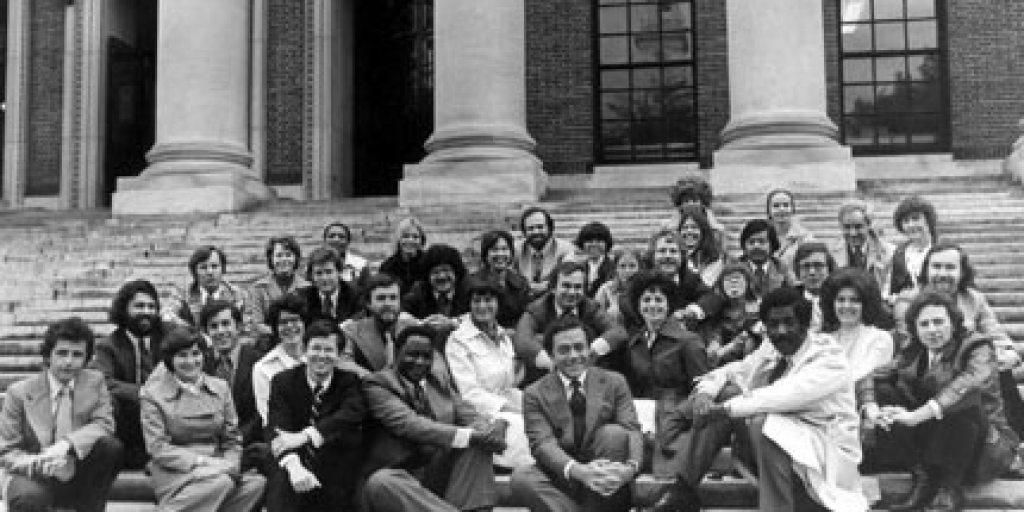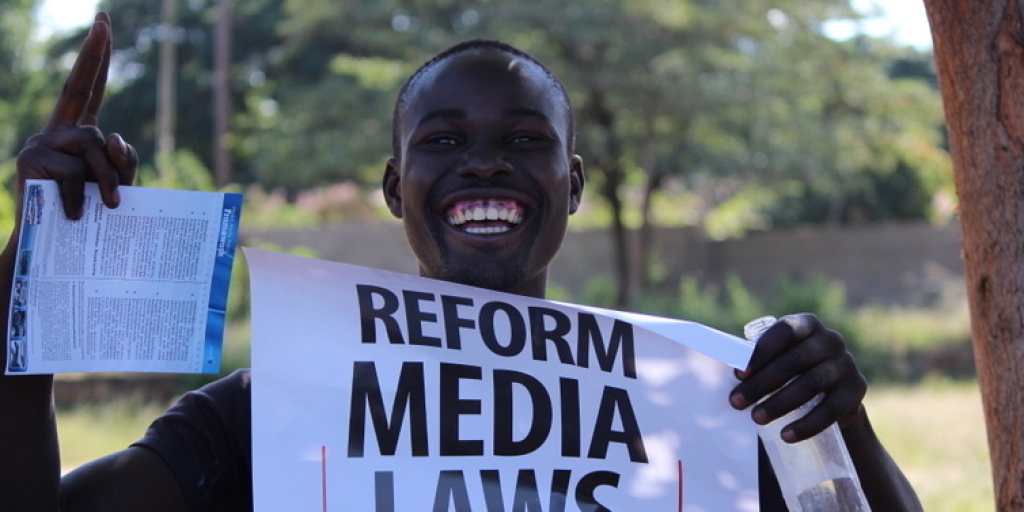Cry, the beloved man: Percy Qoboza
‘It is true that for evil to succeed, it takes far too many good people to keep quiet and stand by.’
The words of Percy Peter Tshidiso Qoboza, one of South Africa’s most respected and decorated journalists, who died in Johannesburg on January 17 – his 50th birthday. He had suffered a heart attack on Christmas Eve and remained in a serious condition until his death at the Rand Clinic in Johannesburg.
The ‘evil’ Percy wrote of are the festering sores of apartheid and racial domination threatening to destroy his country; the ‘good people’ are those who continue to live in blissful ignorance of the racial iniquities that surround them, the injustice they refuse to see.
To his credit, Percy could not keep quiet or stand by – and he shouldered the sacrifices without a flinch. As a committed black journalist, state harassment and persecution were but occupational hazards.
In a country where one’s contribution to the struggle for liberation is invariably measured in terms of the government’s repressive response, Percy paid his dues. Two newspapers he edited were closed down by the government, and he had spent many long months in prison without trial.
In the outside world, his prominence was measured by the many awards he received, including honorary doctorates from Tufts University and Amherst College. He was also the recipient of the Golden Pen Freedom Award from the International Publishers Association and the South African Society of Journalists’ Pringle Award.
A widely-travelled journalist, Percy was South Africa’s Nieman Fellow in 1976.
But Percy was by no means a saint. He had his fair share of detractors. His tough, uncompromising stand against racial oppression earned him the distrust of many in authority. On the other side of the coin, some black radicals in the townships were far from comfortable with Percy’s gospel of nonviolence and negotiation. But he was a survivor at heart, and fiercely independent – confident at all times what was best for himself, his newspaper and his country.
As a writer, Percy had few equals among his peers. His earthy, almost gutsy style struck a chord of rare candor his political foes found hard to smother. His writings poignantly reflected the desperation and bitterness of his people under apartheid. He had lived with and experienced the ravages of the system since his boyhood days in the black slum called Sophiatown.
At 14, as a victim of forced government resettlement, he and his family were escorted by armed police in pouring rain in the back of an open army truck. His home in Sophiatown was destroyed to make way for an elite white suburb, Triomf.
Later, as a young man, he was thrown in jail under the country’s notorious pass laws, which required all blacks to carry their identity documents when in so-called white areas. It was a humiliating experience which earned him a criminal record.
Of that experience, Percy later wrote: ‘For every man you throw in jail for a pass offence, you release later a potential enemy of the state. Nobody who has not gone through the humiliating experience of being locked up like a common criminal can understand this. Take it from me, it’s shocking.’
A staunch Catholic and regular churchgoer, he entertained early ambitions of becoming a priest, but after graduating in theology at Lesotho University, returned home to enter journalism.
Long time friend and colleague Aggrey Klaaste (Nieman Fellow 1980) recently recalled the escapades of their youth when he and Percy often joined a group of white Catholic priests for spirited discussions about the problems of the world.
‘We argued religion, discussed politics and all manner of things with these prelates over copious quantities of booze, to the extent that when the money ran out, we convinced the prelates to raid the collection plate. We cleaned that out. Not once, if my memory serves me right.’
After five years as a cadet reporter on the World, Percy was appointed news editor and later the newspaper’s editor in 1974.
September 1975 saw Percy nominated as South Africa’s Nieman Fellow at Harvard University. It was a critical choice for the South African Nieman Conference who feared then their link with the prestigious programme was nearing an end.
‘We chose Percy and he made a magnificent breakthrough,’ recalled Conference convenor Aubrey Sussens (Nieman Fellow 1961). ‘Not only was his academic record impeccable, but his easygoing personality, his integrity and, above all, his sense of humour won the day.’
Such was the man’s charisma and charm that an American Nieman colleague, Peter Behr (Nieman Fellow 1976), now The Washington Post’s Assistant Managing Editor for financial news, says Percy became the most important teacher the group was to encounter that year.
Boston University professor James C Thomson Jr, then the Curator of the Nieman programme, remembers Percy as ‘an immensely complicated, troubled person’.
‘Percy struggled against great tides of conflict, the greatest of which was, for him, reconciling the mystery of the cruelty and hate he faced with his strong religious commitment. His sensitivity was both his great strength and great impairment. The pain of the situation was almost intolerable’
On his return to South Africa, Percy could so easily have fallen into the trap which lured some of his black predecessors. As editor of a mass circulation newspaper aimed at black readers, he could have taken the easy way out, dished out the marketable diet of sex, sensation and sport, and reaped the financial rewards (as well as a paternalistic pat on the back from his employers).
But Percy had other ideas. He realised that in his profession most black journalists were not given the breaks they deserved. Those employed on white-owned newspapers were rarely allowed to indulge in any serious analysis of the political situation. They were not free to articulate the demands, fears and aspirations of their people in the columns of white newspapers.
The Soweto riots which broke on June 16 1976 provided the occasion for black journalists to show their mettle. They were familiar with the battlefield – the poverty-stricken, soulless townships in which they lived. They spoke the language of the townships, but more importantly, understood the complexities and nuances of black politics.
As head of a major newspaper at the time, Percy was the right man at the right time – black journalists saw him as a strong figure of inspiration. They rose to the occasion, providing readers in South Africa and the world with vivid eyewitness accounts and pictures of one of the major political happenings of our time.
Percy later observed in his writings: ‘For the first time in my life, I could distinguish between what is right and what is wrong.’
‘The thing that scared me most during my Cambridge year (at Harvard) was the fact that I had accepted injustice and discrimination as “part and parcel of our traditional way of life”. After my year, the things I had accepted made me angry. It is because of this that the character of my newspaper has changed tremendously.
‘We are an angry newspaper. For this reason we have made some formidable enemies, and my own personal life is not worth a cent … But I see my role and the role of those people who share my views as articulating, without fear or favour, the aspirations of our people. It is a very hard thing to do’
Under Percy, the World became a much sought-after publication. As a source of news and information on the black political front, it was gospel; to the government, it was seen as the enemy.
To the government’s chagrin, Percy was becoming a legend for his crusading style of journalism; his editorials and popular Percy’s Pitch column earned him acclaim both at home and abroad. In the black community, he was regarded as one of the champions of the cause of justice and liberation.
Percy’s rise to prominence did not go unnoticed in the corridors of power. To the authorities, it was unacceptable that a black man should oppose them with such vigour.
On 19 October 1977, as part of a blanket crackdown on the Black Consciousness movement, the government banned the World and its Sunday edition, Weekend World. That day, the Rand Daily Mail published a page one picture of a forlorn Percy beside his idle printing press, the headline reading ‘The End of Percy’s World’.
Along with scores of others, Percy and Klaaste were thrown into jail for six months under the government’s detention without trial laws. They were never brought before a court of law to answer any charges.
After his release, Percy bounced back as editor of Post Transvaal and Sunday Post two newspapers launched to replace the banned World and Weekend World – and maintained the worthy traditions of courage and integrity in journalism for which he became famous.
In 1980, he was invited to the United States as Editor-in-Residence of the now-defunct Washington Star. During his absence, the government forced the closure of the Post Transvaal. The newspaper was shut down on a technicality, although the authorities made it clear they would have banned the publication in any case.
Percy later took a position as a public relations consultant, but returned to active journalism as Associate Editor of City Press in 1984, becoming its Editor a year later.
The newspaper titles changed, but his inimitable style did not. Even at City Press, his editorials and regular column – now titled Percy’s Itch – were compulsive reading to his thousands of fans.
In the hazardous minefield of South African politics, the role of a respected black Editor extends beyond his newspaper. He is variously expected to fill in as a negotiator, arbitrator, political spokesman and opinion-maker, roles which Percy filled with spectacular courage and aplomb.
When negotiating with government ministers in Cape Town on issues affecting his community, he was often addressed familiarly as ‘Percy, old chap’ by officials across the table. Back in the ghettos, his rapport with young black radicals was at most times based on mutual respect.
‘Percy was one whose protest was voiced in thinking terms. And that is what made him a force in the struggle,’ observed Jack Foisie (Nieman Fellow 1947), a former US foreign correspondent in South Africa.
Recalling his contacts with Percy, Foisie said: ‘I found him unusual [as an anti-apartheid leader], in that he kept his anger over the injustices well hidden, or perhaps it would be better said that he kept it under control.’
‘Whenever we talked, Percy’s commentary on a new development in the racial struggle would often be expressed in droll humor, the cutting edge barely showing.’
Percy realised that as a highly visible opponent of the government, he was under constant security police surveillance. Foisie remembers his late night calls to the Qoboza home in Soweto when seeking comment on a breaking story.
‘It was rare in that, given the limitations of the Soweto phone system in contrast to the modern system in the white area, I was able to reach him at all.
‘Although both he and I assumed that the call was being monitored, Percy never fudged. “Well, since what you write, Jack, is for the world, no sense in not letting the South Africans know about it, too”, he would say.’
Percy’s writings, incisive and perceptive at most times, were not aimed solely at black readers. He was frequently invited to write for publications aimed at whites.
In [such an] 1981 article, he wrote: ‘If you sometimes get mad at me, because the sentiments I express keep you awake at night, then I am glad. I do not see why I should bear the brunt of insomnia worrying about what will happen tomorrow. If many of us can keep awake at night, then maybe we will do the sensible thing – talk together about our joint future’
That passage probably comes closest to epitomising Percy’s dream of a future South Africa – a stable and peaceful country born out of a spirit of negotiation and conciliation among all its people.
Percy was philosophical about many things in life. But if he harboured notions that death provided the ultimate sanctuary from the pains of repression, he was sorely mistaken. They seemed to haunt him even after death.
Soon after the announcement of his death, the Divisional Commissioner of Police for Soweto, Brigadier AP van Zyl, slapped several security restrictions on his funeral. They demanded the service at Regina Mundi church be restricted to 200 people; there should be only one presiding priest; there were to be no political speeches. Security police also warned the family not to allow speeches by anyone representing the United Democratic Front (UDF) or the Azanian People’s Organization (Azapo) – the two main political forces operating in the black townships.
Fears grew that the strong police and army presence would antagonise mourners. Clashes between police and funeral mourners are fairly commonplace in areas like Soweto.
Defying the restrictions, over 5 000 arrived to pay their last respects to Percy, the man they loved, admired and respected. Hundreds of police and army personnel in armoured vehicles lined the route to the Doornkop Cemetery, while a light plane flew low and menacingly over the meandering procession. Some mourners were visibly upset at what they saw as unnecessary intimidation.
A group of youth in the procession danced and chanted political slogans, but there were no violent incidents. It was a dignified farewell.
Among the crowd were diplomats from around the world, including the US Ambassador, Edward Perkins. The media was out in full force and included the foreign press corps and representatives of black and white media in South Africa. There were also trade union officials and local dignitaries like Winnie Mandela and Nthatho Motlana.
Tributes to Percy were paid by many, including those on behalf of Harvard University President Derek Bok and the Nieman Foundation. In his tribute, Bok said: ‘Harvard University grieves at the loss of its Nieman alumnus, counselor and friend.’
‘We mourn Percy’s death as we rejoiced in his life. South African journalism, which has suffered much, now suffers more’
In a cable to Percy’s wife Ann Qoboza, Howard Simons, Curator of the Nieman Foundation, said: ‘On behalf of Niemans everywhere and freedom-loving journalists everywhere, we send you and your children our sincerest condolences.’
‘Nothing has saddened Lippmann House more than Percy’s untimely death. May his memory and that of his courage and integrity and hope be an inspiration to all. He will be missed but never forgotten. Cry, the beloved man.’
- This article originally appeared in the Spring 1988 issue of ‘Nieman Reports’, and can be read on the original web page, here. Republished with the kind permission of the Nieman Foundation.
- Dennis Pather, a 1988 Nieman Fellow, was Editor of the ‘Post Natal’ in Durban when he wrote this piece. He is now retired.




